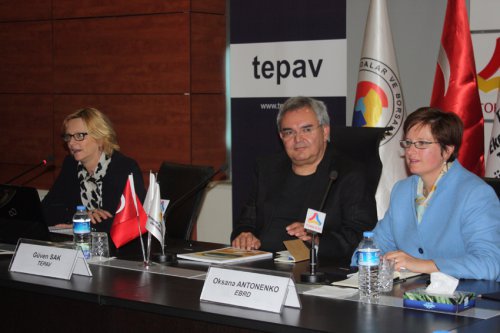“EBRD Transition Report 2013” and Findings on Turkey EBRD says that time is on the side of democracy and reforms in transition countries and that Turkey can do more for economic institutions and structural transformation.

ANKARA – The Transition Report 2013 by the European Bank for Reconstruction and Development (EBRD) was discussed with a meeting at TEPAV on Wednesday, 4 December 2013.
Piroska M. Nagy, Director for Country Strategy and Policy, and Oksana Antonenko, Senior Political Counsellor presented the findings of the report which discusses the outlook in the countries it operates with the aim to accelerate the transition to open market economy and support innovativeness. The meeting was moderated by TEPAV Director Güven Sak.
Piroska Nagy, referring to growth and income data for the 34 countries that the EBRD covers, pointed at the slowdown in the convergence with advanced market economies in Central European, Central Asian, and South and East Mediterranean. Despite the dominant focus on the slowdown in international capital flows, she concentrated on the reformation process (the end of productivity catch-up related to early transition/reform period, stalled reforms and reform reversals). Offering two scenarios (no reform, and reform for political and economic institutions) she stressed that the first led to a major slowdown in income convergence or the halt of convergence in some countries including Croatia, Slovenia, and Russia. The second scenario that involved economic and political reforms on the other hand would enable some Central European and Balkan countries to achieve 80 percent of the EU-15 average income by 2035 and would have a higher convergence and growth impact in non-EU countries.
Nagy stated that despite the slow pace of transition, time was on the side of democracy and reforms. She identified reformation areas as international integration, local transparency and accountability, human capital, and economic inclusion.
Findings about Turkey…
Focusing on the long tradition of market economy and well-developed political institutions in Turkey, Nagy stated that more could be done to in education, inclusion, local governance, and domestic capital markets for further developing economic institutions and structural transformation. In this context, she cited report data on corruption, gender gaps and regional gaps in Turkey. She also stressed that transition countries, Turkey performed better concerning recipients of science and engineering doctorates from American universities but worse concerning the quality of primary and secondary education and patents granted.
EBRD Senior Political Counsellor Oksana Antonenko drew attention to the invigorating role of democracy for reforms.
The meeting continued with the questions and contributions of the audience.
EBRD’s presentation can be seen below.
Please click here for the Transition Report 2013.














